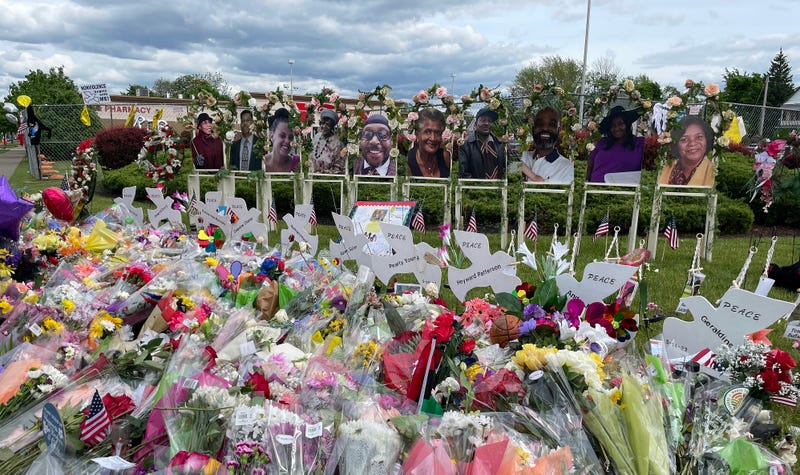
Buffalo, N.Y. (WBEN) - Tuesday marks the one-month anniversary of the deadly mass shooting at the Tops Friendly Market on Jefferson Avenue in Buffalo's East Side community that saw a suspected 18-year-old White supremacist kill 10 Black people and wound three others.

Just days after the horrific attack, Tops partnered with the National Compassion Fund to establish the "Buffalo 5/14 Survivors Fund" for those directly impacted by the shooting. All of the funds raised through this campaign will go to the survivors of the horrible event, including the families of the victims, the people that were physically injured and the people who were emotionally and physically injured on site, as well.
Just before the one-month mark of the shooting, the fund has raised nearly $3 million, with it likely to extend well into the summer months.
"I think it is a wonderful response," said Jeff Dion, Executive Director of the National Compassion Fund. "May 14 was an act of hatred, and you can only counter hatred with love and compassion. I think the '5/14 Survivors Fund' is this community's answer that we won't stand for that. We're going to take care of our own, and we're going to wrap our arms around these people and help them."
Dion was in Buffalo on Friday meeting with the steering committee of the "5/14 Survivors Fund" to discuss where the fund stands and how the decision making locally will play out for distributing the money raised in the end.
Sine 2014, the National Compassion Fund has administered 22 different funds. While they have the technical expertise to help with funds such as the "Buffalo 5/14 Survivors Fund", Dion says it's always important to work with a local steering committee to make those policy decisions.
"We pulled the people together here in this community to serve on that steering committee," he explained. "This is a survivor's fund, and that's because the people that we're looking to help are the surviving family members of those who were killed, the people who were wounded and survived, and the people who were present and experienced psychological trauma and survived. But there's all sorts of details around that that they have to approve a specific eligibility standard, specific timelines."
When it comes to a final determination to distribute the money when the campaign comes to its conclusion, that decision will be made by the local steering committee.
"The important things are how much money has been donated, and how many people do we have in each category. That's why we can't start talking about how much money now, because we don't know how much we're going to end up with," Dion said. "Right now we have around $3 million. By the end of this process, we could have $5 or $6 [million]. So the steering committee has to make that decision when they have real data. That's what we're gonna wait and see."
The fund will continue to be held open for donations to be able to benefit victims. People will be able to continue making donations for a while, which includes the upcoming Taste of Buffalo during the weekend of July 9 in Downtown Buffalo.
"In my experience, corporations give the most amount of money, but they take the longest to give. But the longer we hold it open, the more that helps victims, and we're trying to strike that balance," Dion said.
As for how the funds are going to be distributed, it is not based on economic loss, medical bills or anything like that. It is all about non-economic damages, trauma, and everyone in the same category is going to be treated the same way.
"All of the families of the deceased will get the same amount of money as each other, regardless of whether someone had one kid or 10 kids," Dion explained.
"In terms of injury, the steering committee might decide at the end; we look at how many people were injured, how many nights were they hospitalized. Sometimes when we see that data, like when we did a fund in Indianapolis for the FedEx shooting, they said, 'We think they're all very similar. We're going to give everybody the same amount of money.' But I've done other funds, where you have people who are shot and wounded - some are treated as an outpatient and released the same day, others are hospitalized for like six weeks. How do we make that distinction? We'll look at that, and there might be some tiering, but we won't know until we actually get the data from the actual victims, and they'll make a determination."
When considering the decision for distributing the funds and helping the families of the mass shooting, Dion says he told the steering committee members to ask themselves four questions:
1.) Is it the right thing to do?
2.) Is it fair?
3.) Can it be practically pull off?
4.) Is the information available to make a decision based on that?
As for a potential timeline for the decision making process, the steering committee, along with the Compassion Fund will start off by publishing a draft protocol early next week. After that, it will be about getting feedback from everybody.
"We're going to publish the draft protocol next week, we're going to have a public town hall meeting on July 21. Shortly after that, we will finalize the protocol," Dion said. "We expect that applications will be open sometime in August. We usually keep the applications open for 30 days. We need a deadline or some people won't ever do it. But also, people who are traumatized or have lost a loved one sometimes have a hard time executing administrative tasks, and so we want to make sure we're sensitive to that and give them enough time."
"If there is someone who was injured - it depends on the steering committee's definition of injury - someone was injured, diving behind the rack to try and save themselves from the gunman, maybe they didn't go to the hospital, maybe they went to their family physician. We validate all that treatment. For people who went to ECMC, they're going to be online with us and we're going to have a quick turnaround. But for those other providers, we have to do it the old fashioned way. We send them an email, we send them a fax, and they might say, 'Well, under the HIPAA law, I have 30 days to respond.' So if someone files on the last day that applications are open and we need to do that process, that means we need to build in, at least, a 30-day cushion after applications close to be able to complete validations. Then we go to the steering committee and say, 'Look, this is how much money we have and how many people are in each category.' But once they make that decision about who's going to get what, then people will get paid within days."
Dion is asking for anyone that needs to be put on a contact list for the fund to go to NationalCompassion.org, go to the Buffalo site and sign up so they can be reached and kept up to date about the status.
Hear more of our conversation with Dion in the player below:



